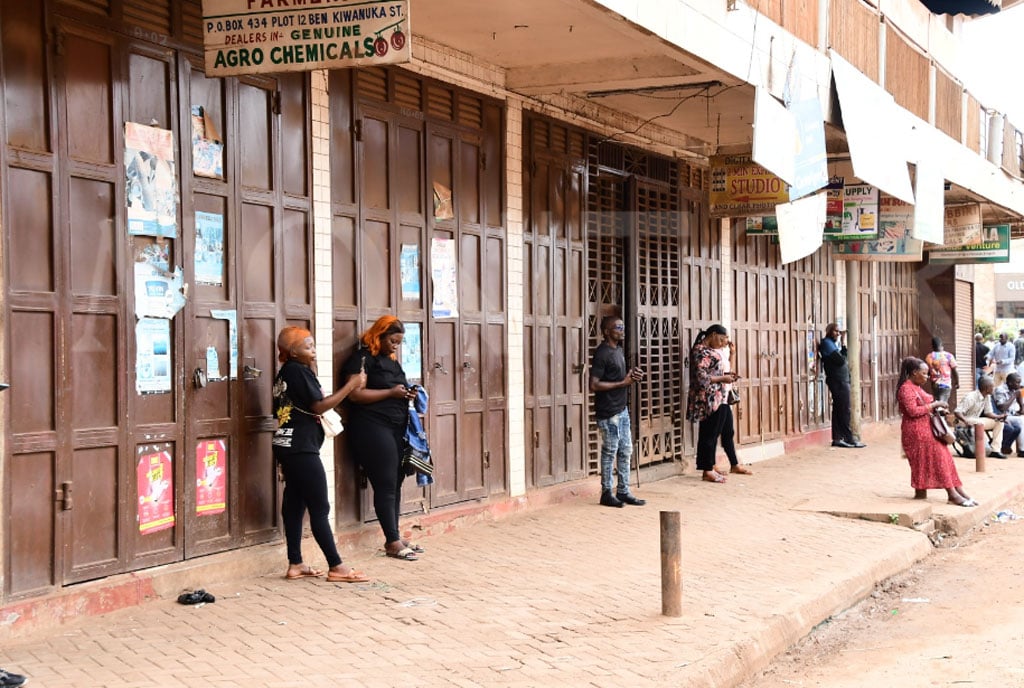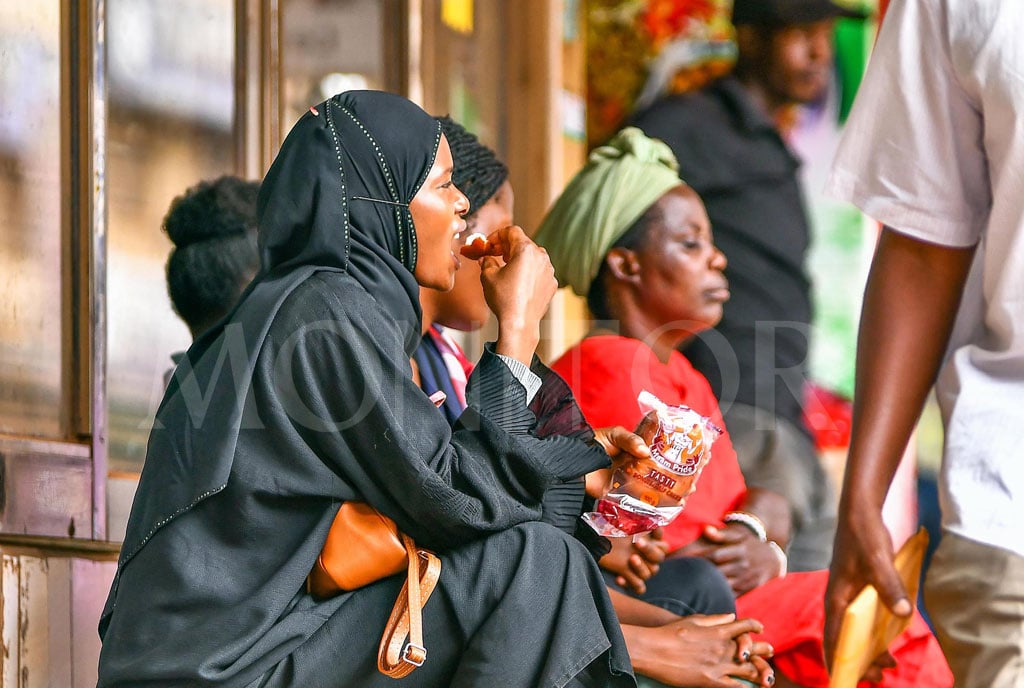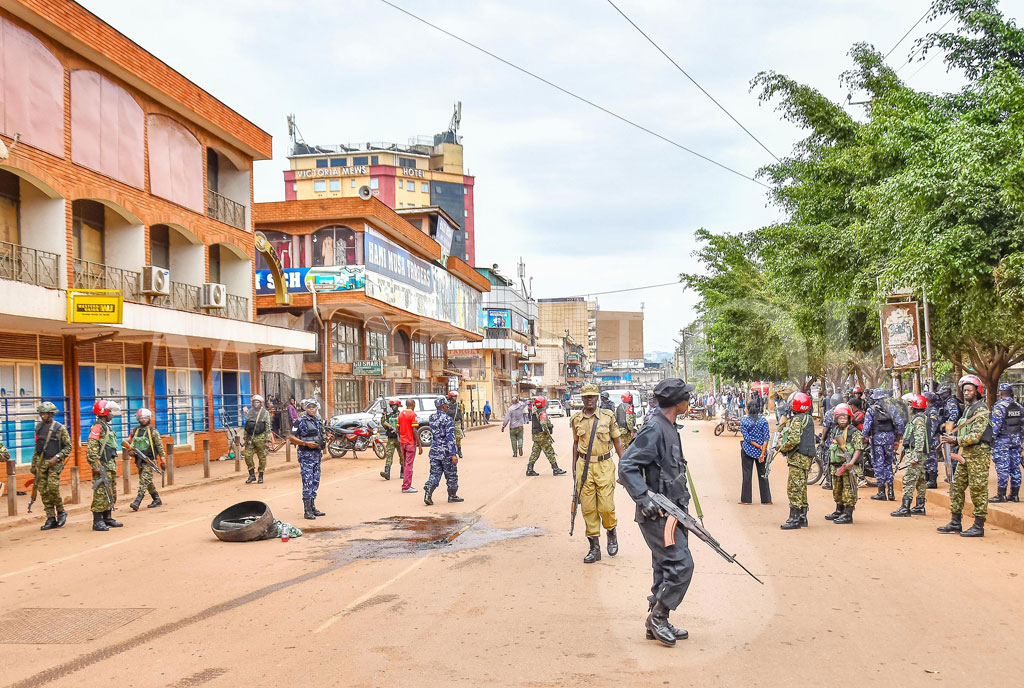Prime
Inside Museveni talks that ended traders’ protest

Business owners stand outside their closed shops during a traders' strike against what they term "unfair taxes and URA's Electronic Fiscal Receipting and Invoicing Solution (EFRIS) system on April 16, 2024 in Kampala. PHOTO/MICHEAL KAKUMIRIZI
What you need to know:
- President Museveni directed a suspension of penalties by URA and urged traders to continue paying taxes while he researches and makes informed decisions on issues raised during the meeting.
After a six-hour wait, 61 handpicked traders finally met President Museveni at State House Entebbe on Friday. The meeting did not end until an hour shy of midnight. Most importantly, Mr Museveni deftly played his cards to ensure that the main protagonists in a standoff that paralysed business for days—the traders and the taxman—emerged with a sense of victory.
“We partially won,” one trader told Sunday Monitor on Saturday.
Mr Ibrahim Bbosa, the taxman’s assistant commissioner in-charge of public and corporate affairs, was quick to clarify that “the President also made it clear that he would not tolerate any form of non-compliance with tax.”
We have established that the leadership of different traders associations attended the Friday showdown talks at the State House. Some of the leaders were from Kampala Capital Traders Association (Kacita), Federation of Uganda Traders Associations (Futa), United Arcades Traders and Entrepreneurs Association (Uatea), and the Uganda Dealers in Used Clothes and Shoes.
Also in attendance were ministers from the dockets of Finance and Kampala as well as officials from the Uganda Revenue Authority (URA).
Outcome of talks
The focus of the talks were, said one leader from a traders’ association, the “unfair Value Added Tax” or VAT, the “rough” implementation of the Electronic Fiscal Receipting and Invoicing System (Efris) by the taxman, the $3 and $3.5 per kilogramme import duty on fabrics and garments and withholding tax, as well as Chinese operating retail shops in downtown Kampala.
“About VAT, the President realised it is a confusing tax because his opinion was the same with the traders, but he said he will not rush with the decision [and] he told us that [government technocrats] are going to study and analyse it so that by [May] 7 when he is meeting us he should come with conclusive resolution,” Dr Thadeus Musoke Nagenda, the chairperson of Kacita, said yesterday.
He added that Mr Museveni also ordered the immediate stoppage of the enforcement of Efris and an immediate suspension of penalties. URA was also barred from issuing new ones as well as collecting those already issued.
Efris storm
The alleged rough enforcement of Efris by URA officials largely prompted Kampala-based traders dealing in merchandise, clothes, garments, among others, to close their shops. The system was rolled out by the taxman on January 1, 2021 as an automated compliance process mandating all VAT taxpayers, whose business makes more than Shs150m annual sales to enrol on it. It entails the use of Electronic Fiscal Devices (EFD), issuing e-invoices, e-receipts so that it is easy for URA to track real time transactions.
Traders protested saying they are not aware about its functionality. They added that its enforcement by URA made it unbearable.
“The only pending issues are the 35 percent value and $3 and $3.5 percent per kilogramme, but others it is like the President gave a breathing space for traders and then we resolved to start operating as other issues are being resolved,” Dr Nagenda told Sunday Monitor yesterday.
Museveni speaks out
Mr Museveni confirmed meeting the traders, posting on his official X (formerly Twitter) platform that several issues—such as unsuitability of Efris to traders, calculating taxes on textiles in kilogrammes, proposed increment of the VAT threshold from the current Shs150m annual turnover, as well as manufactures who engage in wholesale and retail—came up for discussion. The President noted that he asked the traders for some time to allow him to do research and make informed decisions.
Mr Museveni will hold a consultative meeting with technocrats from the Finance ministry, URA, and others on April 24. Thereafter, the President will meet all traders at Kololo Independence Ceremonial Grounds where a final decision on all matters will be taken.
“In the meantime, I have directed that URA refrain from issuing penalties and recovering any penalties that have already been issued, but taxpayers must continue to pay their taxes as usual,” President Museveni wrote on X.
Traders told Sunday Monitor that no minister was given a chance to speak at the meeting on Friday. Only Mr John Musinguzi Rujoki, the commissioner General of URA, gave his two cents, explaining to the President the taxes and their values.
VAT under the spotlight
Mr Rujoki, we were told, justified why VAT is charged four times—i.e. from the manufacturer/importer, wholesaler, retailer and final consumer.
“The President asked [Mr Rujoki] why VAT is not calculated once in factory or on importation, but he said the country will lose a lot of taxes if that is done,” Mr Andrew Rubeihayo, the chairperson of the Uganda Dealers in Used Clothes and Shoes who attended the meeting, said.
On Thursday, Dr Nagenda told this publication that every importer or manufacturer adds the 18 percent VAT on the products, which they remit to URA. The chain, he proceeded to note, continues as the wholesaler who buys the products also adds the cost net of VAT, a profit margin and 18 percent VAT.
“By principle, VAT payable is output VAT minus VAT input from the importer/manufacturer. Which in simple calculation happens to be similar to charging 18 percent VAT on the profit,” Dr Nagenda said.
This concern, according to traders who attended the meeting, is one of many that will be addressed when they meet Mr Museveni on May 7.
The President revealed on X that the traders should answer a vital question of: “Do we want to build our country Uganda or other countries by trading in goods produced by them?”
He added: “Must we continue to cause a haemorrhage of the little that we have made through agriculture and other sectors by sending our money outside? Uganda should not be a supermarket for other countries.”
URA says
Mr Ibrahim Bbosa, the URA spokesperson, confirmed the developments and said the way forward will be given by the President at Kololo after the engagement with technocrats.
“The President listened to the traders’ complaints and promised to study them further. He also expressed his desire to avoid making wrong decisions because he was rushed by the traders,” Mr Bbosa said.




